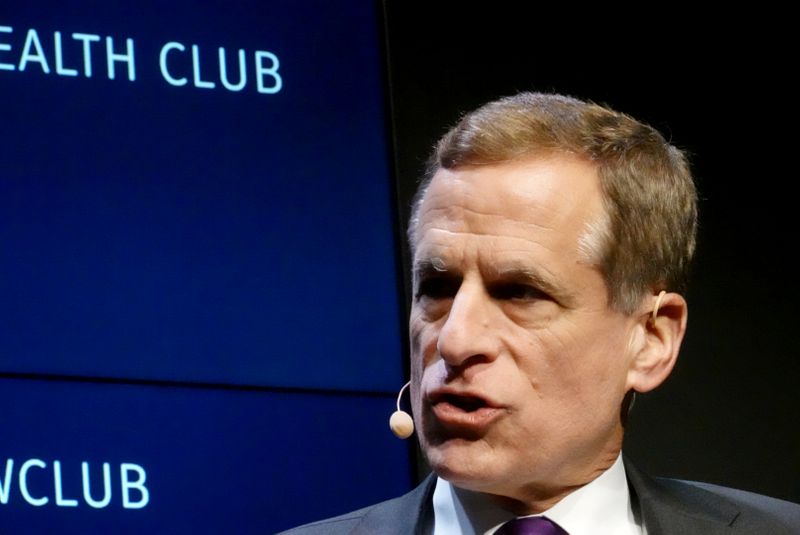
FILE PHOTO: Dallas Federal Reserve Bank President Robert Kaplan speaks at the Commonwealth Club in San Francisco, U.S., October 11, 2019. REUTERS/Ann Saphir
December 17, 2019
By Jonnelle Marte
NEW YORK (Reuters) – Two Federal Reserve policymakers on Tuesday made clear that they back the central bank’s current stance, echoing words by other policymakers last week that interest rates are in a sweet spot heading into 2020 and that the bar to cutting or raising them will be high.
“The appropriate path of policy is to stay where we are,” Dallas Fed President Robert Kaplan, who is a voting member of the Fed’s rate-setting committee next year, said at an event hosted by the Council on Foreign Relations in New York. He added that he had “penciled in” no changes to borrowing costs in 2020.
Boston Fed President Eric Rosengren also said the Fed is unlikely to need to cut interest rates further in the near term, barring a “material change” in the outlook for the U.S. economy. He said that so far, there is little chance of an economic downturn next year.
The U.S. central bank unanimously voted to leave interest rates steady last week. It had lowered its benchmark overnight lending rate three times this year to counteract harmful impacts on the economy from slowing global growth and the U.S.-China trade war.
At the recent meeting, economic projections showed 13 of the Fed’s 17 policymakers forecast no change in interest rates until at least 2021. The other four saw only one rate hike next year.
Kaplan previously said he supported the most recent rate cut on the condition that the Fed send a signal that no further cuts were likely without a substantial change to the economic outlook.
Last Friday, two top Fed policymakers also said they were content to leave rates where they are for the foreseeable future.
Kaplan said he believed the Fed’s cuts had helped balance risks to the economy compared with earlier this year and that his base case is that U.S consumers will continue to power the economy in 2020 as long as the job market remains tight. U.S. unemployment is near a 50-year low.
Rosengren, who voted against all three of the central bank’s interest rate reductions this year, also expressed confidence in the outlook, reiterating the Fed’s recent mantra that the economy is in “a good place.” He noted retailers he has spoken with are optimistic about the holiday sales period.
“Plentiful jobs and growth in income have provided improvements in confidence and bode well for holiday sales and beyond,” Rosengren said in a speech to the Forecasters Club of New York.
That said, Kaplan argued that while he expects the economy to grow about 2% next year, inflation pressures are likely to remain benign because businesses are not able to pass higher prices along to their customers.
Rosengren, by contrast, said he sees inflation rising to around the Fed’s 2% goal, despite the central bank having missed that mark repeatedly in the decade since the financial crisis.
On risks to the economy, Kaplan cautioned that the Trump administration’s strategy of using tariff threats as a foreign policy tool against multiple countries poses ongoing uncertainty. While an easing of tensions in the U.S.-China trade war last week was a welcome development, he said, it did not mean tensions are going away.
“‘Phase one’” is better than not having a ‘phase one’ but it doesn’t mean there won’t still be trade uncertainty,” Kaplan said in an interview later on Tuesday with Bloomberg TV. “I think the trade issues with China are going to go on for… years.”
(Reporting by Jonnelle Marte and Lindsay Dunsmuir; Writing by Lindsay Dunsmuir; Editing by Chizu Nomiyama and Dan Grebler)

